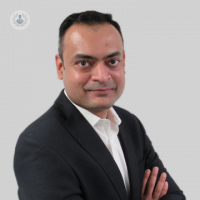Trigeminal neuralgia: An expert's guide
Written in association with:In his latest online article, renowned London-based Dr Roshan Thawale explains trigeminal neuralgia. This is a neuropathic condition, involves the trigeminal nerve—a major nerve originating from the brain—sending faulty signals, thus perceiving ordinary signals as excruciating pain. It can be a very painful condition, and can lead to severe mental distress and even self-harm in some cases.

Causes of Trigeminal Neuralgia
The primary cause of trigeminal neuralgia is often considered idiopathic, where the origin remains unknown. Additionally, certain neurologic factors can contribute to this condition. A vascular loop, formed by blood vessels impacting the trigeminal nerve root or nuclei, can be a factor.
Neurodegenerative conditions like multiple sclerosis are also known to induce trigeminal neuralgia. Trauma, dental work, and temporomandibular joint dysfunction can trigger episodes. Furthermore, conditions such as vitamin B12 deficiency and long-standing diabetes may also contribute to the development of trigeminal neuralgia.
Seeking Medical Attention for Trigeminal Neuralgia
If you experience sporadic facial pain, the severity should guide your decision to consult a doctor. If you endure intense, brief, electric shock-like sensations lasting only a few seconds, it could indicate trigeminal neuralgia. However, all facial pain should be evaluated by a healthcare professional to rule out other possible causes, including dental issues or joint dysfunction.
Emergency Treatment for Trigeminal Neuralgia
While trigeminal neuralgia typically doesn't demand immediate medical attention, extreme cases warrant specialist consultation. Individuals facing significant social distress, struggling with daily activities, or experiencing adverse medication effects should seek help from a pain specialist, neurologist, or neurosurgeon.
Underlying Issues and Trigeminal Neuralgia
Most instances of trigeminal neuralgia lack a definitive cause (idiopathic). However, some are linked to vascular anomalies such as vascular loops, often related to vascular diseases or lifestyle factors like smoking. Tumours, cancers, multiple sclerosis, and deficiencies in vitamins B and D can also contribute. Seeking specialist guidance is advisable if symptoms point towards trigeminal neuralgia.
Non-Surgical Treatment Options
Non-surgical treatments are available for trigeminal neuralgia. Patients are educated about their condition, providing a foundational understanding. Medications can be prescribed by a pain management specialist after evaluating the patient's specific needs. If initial medications result in side effects, more options are explored. Targeted injections, containing local anaesthetics or steroids, can offer pain relief. Modern imaging techniques have made injections less invasive, allowing for selective nerve root blocks with real-time guidance. There is also a treatment available in which an electric current is passed through the nerves. This allows for longer-lasting pain relief.
Dr Roshan Thawale is a renowned pain management specialist based in London. If you would like to book a consultation with Dr Thawale, you can do so today via his Top Doctors profile.



